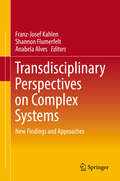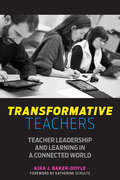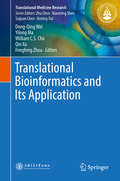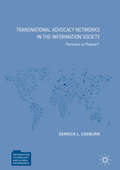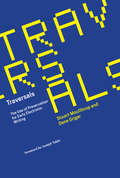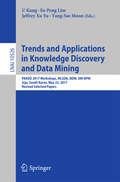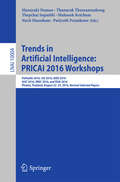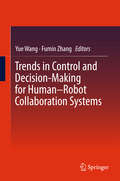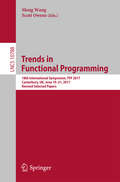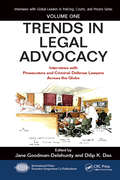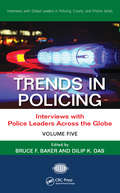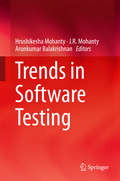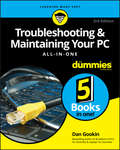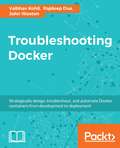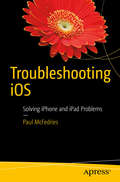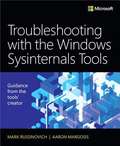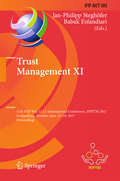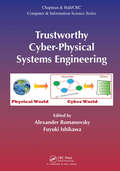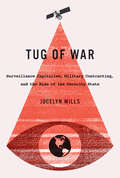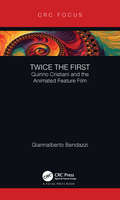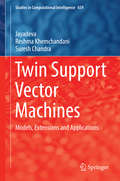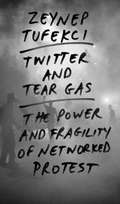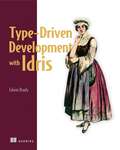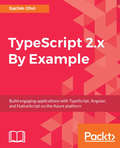- Table View
- List View
Transdisciplinary Perspectives on Complex Systems
by Franz-Josef Kahlen Shannon Flumerfelt Anabela AlvesThis book presents an internationally comprehensive perspective into the field of complex systems. It explores the challenges of and approaches to complexity from a broad range of disciplines, including big data, health care, medicine, mathematics, mechanical and systems engineering, air traffic control and finance. The book's interdisciplinary character allows readers to identify transferable and mutually exclusive lessons learned among these disciplines and beyond. As such, it is well suited to the transfer of applications and methodologies between ostensibly incompatible disciplines. This book provides fresh perspectives on comparable issues of complexity from the top minds on systems thinking.
Transformative Teachers: Teacher Leadership and Learning in a Connected World
by Kira J. Baker-DoyleTransformative Teachers offers an insightful look at the growing movement of civic-minded educators who are using twenty-first-century participatory practices and connected technologies to organize change from the ground up. Kira J. Baker-Doyle highlights the collaborative, grassroots tactics that activist teachers are implementing to transform their profession and pursue greater social justice and equity in education. The author provides a framework and practical suggestions for charting the path to transformative teacher leadership as well as suggestions for how others, including administrators and outside organizations, can support them. In addition, the book profiles fifteen transformative teachers who are changing the face of education, features three case studies of organizational allies (Edcamps, the Philadelphia Education Fund, and the Connected Learning Alliance), and includes insights from a wide range of educational leaders. A guide to the norms and practices of innovative educators, Transformative Teachers offers a clear and compelling vision of the potential for grassroots change in education.
Translational Bioinformatics and Its Application
by Dong-Qing Wei Yilong Ma William C. S. Cho Qin Xu Fengfeng ZhouThis book offers a detailed overview of translational bioinformatics together with real-case applications. Translational bioinformatics integrates the areas of basic bioinformatics, clinical informatics, statistical genetics and informatics in order to further our understanding of the molecular basis of diseases. By analyzing voluminous amounts of molecular and clinical data, it also provides clinical information, which can then be applied. Filling the gap between clinic research and informatics, the book is a valuable resource for human geneticists, clinicians, health educators and policy makers, as well as graduate students majoring in biology, biostatistics, and bioinformatics.
Transnational Advocacy Networks in the Information Society: Partners or Pawns? (Information Technology and Global Governance)
by Derrick L. CogburnThis book examines the role of transnational advocacy networks in enabling effective participation for individual citizens in the deliberative processes of global governance. Contextualized around the international conference setting of the United Nations-sponsored World Summit on the Information Society (WSIS) in 2003 and 2005, the book sees epistemic communities and information and communication technologies (ICTs) as critical to the effectiveness of this important organizational form. Historically, governments have dominated the official “conference diplomacy” surrounding these World Summits. However, reflecting the UN General Assembly resolution authorizing WSIS, transnational civil society and private sector organizations were invited to participate as official partners in a multistakeholder dialogue at the summit alongside the more traditional governments and international organizations. This book asks: are transnational advocacy networks active in the global information society influential partners in these global governance processes, or merely symbolic tokens—or pawns? Cogburn explores the factors that enabled some networks—such as the Internet Governance Caucus—to persist and thrive, while others failed, and sees linkages with epistemic communities—such as the Global Internet Governance Academic Network—and ICTs as critical to network effectiveness.
Traversals: The Use of Preservation for Early Electronic Writing (The\mit Press Ser.)
by Stuart Moulthrop Dene GrigarAn exercise in reclaiming electronic literary works on inaccessible platforms, examining four works as both artifacts and operations.Many pioneering works of electronic literature are now largely inaccessible because of changes in hardware, software, and platforms. The virtual disappearance of these works—created on floppy disks, in Apple's defunct HyperCard, and on other early systems and platforms—not only puts important electronic literary work out of reach but also signals the fragility of most works of culture in the digital age. In response, Dene Grigar and Stuart Moulthrop have been working to document and preserve electronic literature, work that has culminated in the Pathfinders project and its series of “Traversals”—video and audio recordings of demonstrations performed on historically appropriate platforms, with participation and commentary by the authors of the works. In Traversals, Moulthrop and Grigar mine this material to examine four influential early works: Judy Malloy's Uncle Roger (1986), John McDaid's Uncle Buddy's Phantom Funhouse (1993), Shelley Jackson's Patchwork Girl (1995) and Bill Bly's We Descend (1997), offering “deep readings” that consider the works as both literary artifacts and computational constructs. For each work, Moulthrop and Grigar explore the interplay between the text's material circumstances and the patterns of meaning it engages and creates, paying attention both to specificities of media and purposes of expression.
Trends and Applications in Knowledge Discovery and Data Mining
by U Kang Ee-Peng Lim Jeffrey Xu Yu Yang-Sae MoonThis book constitutes the thoroughly refereed post-workshop proceedings at PAKDD Workshops 2017, held in conjunction with PAKDD, the 21st Pacific-Asia Conference on Knowledge Discovery and Data Mining in May 2017 in Jeju, South Korea. The 17 revised papers presented were carefully reviewed and selected from 38 submissions. The workshops affiliated with PAKDD 2017 include: Workshop on Machine Learning for Sensory Data Analysis (MLSDA), Workshop on Biologically Inspired Data Mining Techniques (BDM), Pacific Asia Workshop on Intelligence and Security Informatics (PAISI), and Workshop on Data Mining in Business Process Management (DM-BPM).
Trends in Artificial Intelligence: PRICAI 2016 Workshops
by Masayuki Numao Thanaruk Theeramunkong Thepchai Supnithi Mahasak Ketcham Narit Hnoohom Patiyuth PramkeawThis book constitutes the refereed proceedings of the 14th Pacific Rim Collocated PRICAI 2016 Workshops on Artificial Intelligence, held in Phuket, Thailand, in August 2016. The 16 full papers presented in this volume were carefully reviewed and selected from 46 submissions. The are organized around the following topics: e-health mining; image, information and intelligent applications; artificial intelligence for educational applications; artificial intelligence for tourism; emphatic computing;artificial intelligence and applications.
Trends in Control and Decision-Making for Human–Robot Collaboration Systems
by Yue Wang Fumin ZhangThis book provides an overview of recent research developments in the automation and control of robotic systems that collaborate with humans. A measure of human collaboration being necessary for the optimal operation of any robotic system, the contributors exploit a broad selection of such systems to demonstrate the importance of the subject, particularly where the environment is prone to uncertainty or complexity. They show how such human strengths as high-level decision-making, flexibility, and dexterity can be combined with robotic precision, and ability to perform task repetitively or in a dangerous environment. The book focuses on quantitative methods and control design for guaranteed robot performance and balanced human experience from both physical human-robot interaction and social human-robot interaction. Its contributions develop and expand upon material presented at various international conferences. They are organized into three parts covering: one-human-one-robot collaboration; one-human-multiple-robot collaboration; and human-swarm collaboration. Individual topic areas include resource optimization (human and robotic), safety in collaboration, human trust in robot and decision-making when collaborating with robots, abstraction of swarm systems to make them suitable for human control, modeling and control of internal force interactions for collaborative manipulation, and the sharing of control between human and automated systems, etc. Control and decision-making algorithms feature prominently in the text, importantly within the context of human factors and the constraints they impose. Applications such as assistive technology, driverless vehicles, cooperative mobile robots, manufacturing robots and swarm robots are considered. Illustrative figures and tables are provided throughout the book. Researchers and students working in controls, and the interaction of humans and robots will learn new methods for human-robot collaboration from this book and will find the cutting edge of the subject described in depth.
Trends in Functional Programming: 18th International Symposium, Tfp 2017, Canterbury, Uk, June 19-21, 2017, Revised Selected Papers (Lecture Notes In Computer Science #10788)
by Scott Owens Meng WangThis book constitutes the thoroughly refereed revised selected papers of the 18th International Symposium on Trends in Functional Programming, TFP 2017, held in Canterbury, UK, in June 2017. The 8 revised full papers were selected from 16 submissions and present papers in all aspects of functional programming, taking a broad view of current and future trends in the area.
Trends in Legal Advocacy: Interviews with Prosecutors and Criminal Defense Lawyers Across the Globe, Volume One (Interviews with Global Leaders in Policing, Courts, and Prisons)
by Jane Goodman-Delahunty and Dilip K. DasA new installment of the series of Interviews with Global Leaders in Policing, Courts, and Prisons, this book expands upon the criminal justice coverage of earlier volumes, offering the voices of 14 lawyers from 13 diverse locales, including countries in Africa, North America, South America, Europe, and the Asia-Pacific region. This book is intended for students and others focusing on law and legal studies, policing, psychology and law, criminology, justice studies, public policy, and for all those interested in the front lines of legal change around the world. Featuring versatile chapters perfect for individual use or as part of a collection, this volume offers a personal approach to the legal world for students and experienced professionals.
Trends in Policing: Interviews with Police Leaders Across the Globe, Volume Five (Interviews with Global Leaders in Policing, Courts, and Prisons #1)
by Bruce F. Baker Dilip K. DasTrends in Policing: Interviews with Police Leaders Across the Globe, Volume Five, is based on the premise that police officials have a wealth of experience that can make significant contributions to our understanding of the prospects and problems of policing today. Each chapter consists of an interview with a policing leader that explores their understanding of policing developments and current challenges in their countries and internationally, and examines how they evaluate or interpret these developments.
Trends in Software Testing
by Hrushikesha Mohanty J. R. Mohanty Arunkumar BalakrishnanThis book is focused on the advancements in the field of software testing and the innovative practices that the industry is adopting. Considering the widely varied nature of software testing, the book addresses contemporary aspects that are important for both academia and industry. There are dedicated chapters on seamless high-efficiency frameworks, automation on regression testing, software by search, and system evolution management. There are a host of mathematical models that are promising for software quality improvement by model-based testing. There are three chapters addressing this concern. Students and researchers in particular will find these chapters useful for their mathematical strength and rigor. Other topics covered include uncertainty in testing, software security testing, testing as a service, test technical debt (or test debt), disruption caused by digital advancement (social media, cloud computing, mobile application and data analytics), and challenges and benefits of outsourcing. The book will be of interest to students, researchers as well as professionals in the software industry.
Troubleshooting and Maintaining Your PC All-in-One For Dummies
by Dan GookinStop being a prisoner to your PC! Need a PC problem fixed in a pinch? Presto! Troubleshooting & Maintaining Your PC All-in-One For Dummies offers 5 books in 1 and takes the pain out of wading through those incomprehensible manuals, or waiting for a high-priced geek to show up days or weeks after you need them. Arming you with everything you need to get that pesky PC working for you ASAP, this handy guide walks you through all the steps to restoring whatever's making your PC go rogue —so you can get back to making it work for you. There's nothing worse than firing up your PC only to discover it's inexplicably unresponsive. With this guide, you'll gain all the skills and insight you need to need to bring it back to life —and to prevent it from ever leaving you in the lurch again. Find out what's behind common PC problems Solve email and web woes, both big and small Perform regular maintenance and get serious about backups Troubleshoot to find solutions to your issues and learn proper maintenance to head off future headaches! Your PC problems aren't as big as you think! Take matters into your own hands with the helpful instruction provided inside this book!
Troubleshooting Docker
by John Wooten Rajdeep Dua Vaibhav KohliStrategically design, troubleshoot, and automate Docker containers from development to deployment About This Book • Utilize current and emergent technologies for effective Docker orchestration and management • A step-by-step guide to diagnosing and fixing problems with Docker containers. Who This Book Is For This book is intended for seasoned solutions architects, developers, and programmers, system engineers, and administrators to help you troubleshoot common areas of Docker containerization. If you are looking to build production-ready Docker containers for automated deployment, you will be able to master and troubleshoot both the basic functions and the advanced features of Docker. Advanced familiarity with the Linux command line syntax, unit testing, the Docker Registry, Github, and leading container hosting platforms and Cloud Service Providers (CSP) are the prerequisites. What You Will Learn • Install Docker ecosystem tools and services, Microservices and N-tier applications • Create re-usable, portable containers with help of automation tools • Network and inter-link containers • Attach volumes securely to containers • Consume and troubleshoot Docker APIs • Troubleshooting issue of Docker deployment in Public cloud • Ease the process of container management with Kubernetes In Detail This book will traverse some common best practices to for complex application scenarios where troubleshooting can be successfully employed to provide the repeatable processes and advantages that containers can deliver. This book will be a practical guide showing how to fix real-life issues related to installation, memory, Dockerfile syntax, connection, authorization, networking and so on in Docker. This book will also teach how to solve errors that occur during advanced setup and administration and deployment in a step-by-step fashion. By sequentially working through the real-world production scenarios in each chapter throughout the book, you will gain insight into and mastery of common areas not only for effective troubleshooting, but ways and means to avoid troubleshooting in the first place. This book will also cover tips and tricks that make the workflow easier. Style and approach An easy-to-follow guide full of interactive examples of real-world development and deployment scenarios. Ample screenshots, workflows, complementary tools, and related terminal commands are provided to address a wide range of practical and situational applications.
Troubleshooting iOS
by Paul McfedriesUnderstand and solve many different kinds of iPhone and iPad problems. This book covers both general troubleshooting techniques applicable in a wide variety of situations as well as specific fixes for topics such as networking, apps, photos, the battery, and syncing. Glitches, hiccups, and crashes just aren't supposed to happen with iOS, but alas, all too often they do. It is these non-obvious fixes, workarounds, and preventative measures that form the core of iOS Troubleshooting. With clear, straightforward prose, this book will take the reader through hundreds of iOS problems, explain the reasons for them, and provide easy to understand solutions to get the device (and you) back in business. What you'll learn: Fix cellular and networking connections Incorporate accessories effectively Solve battery and charging issues Clear up syncing and iCloud glitches Who this book is for: Any person who uses an iOS device.
Troubleshooting OpenVPN
by Eric F. CristThe book is for system administrators who are experienced and well versed with OpenVPN. You should possess intermediate to master level proficiency with OpenVPN. All OpenVPN users can leverage this book.
Troubleshooting With The Windows Sysinternals Tools (Second Edition)
by Mark Russinovich Aaron MargosisIT pros and power users consider the free Windows Sysinternals tools indispensable for diagnosing, troubleshooting, and deeply understanding the Windows platform. In this extensively updated guide, Sysinternals creator Mark Russinovich and Windows expert Aaron Margosis help you use these powerful tools to optimize any Windows system's reliability, efficiency, performance, and security. The authors first explain Sysinternals' capabilities and help you get started fast. Next, they offer in-depth coverage of each major tool, from Process Explorer and Process Monitor to Sysinternals' security and file utilities. Then, building on this knowledge, they show the tools being used to solve real-world cases involving error messages, hangs, sluggishness, malware infections, and much more.
Trust Management XI: 11th IFIP WG 11.11 International Conference, IFIPTM 2017, Gothenburg, Sweden, June 12-16, 2017, Proceedings (IFIP Advances in Information and Communication Technology #505)
by Jan-Philipp Steghöfer and Babak EsfandiariThis book constitutes the refereed proceedings of the 11th IFIP WG 11.11 International Conference on Trust Management, IFIPTM 2017, held in Gothenburg, Sweden, in June 2017. The 8 revised full papers and 6 short papers presented were carefully reviewed and selected from 29 submissions. The papers are organized in the following topical sections: information sharing and personal data; novel sources of trust and trust information; applications of trust; trust metrics; and reputation systems. Also included is the 2017 William Winsborough commemorative address and three short IFIPTM 2017 graduate symposium presentations.
Trustworthy Cyber-Physical Systems Engineering (Chapman & Hall/CRC Computer and Information Science Series #36)
by Alexander Romanovsky Fuyuki IshikawaFrom the Foreword "Getting CPS dependability right is essential to forming a solid foundation for a world that increasingly depends on such systems. This book represents the cutting edge of what we know about rigorous ways to ensure that our CPS designs are trustworthy. I recommend it to anyone who wants to get a deep look at these concepts that will form a cornerstone for future CPS designs." --Phil Koopman, Carnegie Mellon University, Pittsburgh, Pennsylvania, USA Trustworthy Cyber-Physical Systems Engineering provides practitioners and researchers with a comprehensive introduction to the area of trustworthy Cyber Physical Systems (CPS) engineering. Topics in this book cover questions such as What does having a trustworthy CPS actually mean for something as pervasive as a global-scale CPS? How does CPS trustworthiness map onto existing knowledge, and where do we need to know more? How can we mathematically prove timeliness, correctness, and other essential properties for systems that may be adaptive and even self-healing? How can we better represent the physical reality underlying real-world numeric quantities in the computing system? How can we establish, reason about, and ensure trust between CPS components that are designed, installed, maintained, and operated by different organizations, and which may never have really been intended to work together? Featuring contributions from leading international experts, the book contains sixteen self-contained chapters that analyze the challenges in developing trustworthy CPS, and identify important issues in developing engineering methods for CPS. The book addresses various issues contributing to trustworthiness complemented by contributions on TCSP roadmapping, taxonomy, and standardization, as well as experience in deploying advanced system engineering methods in industry. Specific approaches to ensuring trustworthiness, namely, proof and refinement, are covered, as well as engineering methods for dealing with hybrid aspects.
Tug of War: Surveillance Capitalism, Military Contracting, and the Rise of the Security State (Carleton Library Series #242)
by Jocelyn WillsSelling Earth observation satellites on their abilities to predict and limit adverse environmental change, politicians, business leaders, the media, and technology enthusiasts have spent sixty years arguing that space exploration can create a more peaceful, prosperous world. Capitalist states have also socialized the risk and privatized the profits of the commercial space industry by convincing taxpayers to fund surveillance technologies as necessary components of sovereignty, freedom, and democracy. Jocelyn Wills’s Tug of War reminds us that colonizing the cosmos has not only accelerated the arms race but also encouraged government contractors to compete for the military and commercial spoils of surveillance. Although Canadians prefer to celebrate their role as purveyors of peaceful space applications, Canada has played a pivotal part in the expansion of neoliberal policies and surveillance networks that now encircle the globe, primarily as a political ally of the United States and component supplier for its military-industrial complex. Tracing the forty-five-year history of Canada’s largest space company – MacDonald, Dettwiler and Associates (MDA) – through the lens of surveillance studies and a trove of oral history transcripts, government documents, trade journals, and other sources, Wills places capitalism’s imperial ambitions squarely at the centre of Canada-US relations and the privatization of the Canadian political economy. Tug of War confronts the mythic lure of technological progress and the ways in which those who profess little interest in war rationalize their leap into military contracting by avoiding the moral and political implications of their work.
Twice the First: Quirino Cristiani and the Animated Feature Film
by Giannalberto BendazziGiannalberto Bendazzi brings to light some of the lost relics of animation history with his new book, Twice the First: Quirino Cristiani and the Animated Feature Film. Unlike other works, however, Bendazzi focuses on the growth of animation in non-western countries. This book particularly emphasizes the contributions of Quirino Cristiani and how his work influenced other animators. Bendazzi provides in-depth coverage about Cristiani’s life, both professionally and personally. Twice the First takes the reader on an exciting journey through the historical development of animation through the eyes of Quirino Cristiani. Key Features A look back at the modest beginnings of feature film animation. An exciting account of some facts never before revealed in the history and development of animated film Among the fascinating information the reader can learn from this book, is that not all the action in cinematography took place in North America and Western Europe This book provides an important service in documenting the early period of animation and filling in the gaps in the history of the development of animation.
Twin Support Vector Machines
by Jayadeva Reshma Khemchandani Suresh ChandraThis book provides a systematic and focused study of the various aspects of twin support vector machines (TWSVM) and related developments for classification and regression. In addition to presenting most of the basic models of TWSVM and twin support vector regression (TWSVR) available in the literature, it also discusses the important and challenging applications of this new machine learning methodology. A chapter on "Additional Topics" has been included to discuss kernel optimization and support tensor machine topics, which are comparatively new but have great potential in applications. It is primarily written for graduate students and researchers in the area of machine learning and related topics in computer science, mathematics, electrical engineering, management science and finance.
Twitter and Tear Gas: The Power and Fragility of Networked Protest
by Zeynep TufekciA firsthand account and incisive analysis of modern protest, revealing internet-fueled social movements’ greatest strengths and frequent challenges To understand a thwarted Turkish coup, an anti–Wall Street encampment, and a packed Tahrir Square, we must first comprehend the power and the weaknesses of using new technologies to mobilize large numbers of people. An incisive observer, writer, and participant in today’s social movements, Zeynep Tufekci explains in this accessible and compelling book the nuanced trajectories of modern protests—how they form, how they operate differently from past protests, and why they have difficulty persisting in their long-term quests for change. Tufekci speaks from direct experience, combining on-the-ground interviews with insightful analysis. She describes how the internet helped the Zapatista uprisings in Mexico, the necessity of remote Twitter users to organize medical supplies during Arab Spring, the refusal to use bullhorns in the Occupy Movement that started in New York, and the empowering effect of tear gas in Istanbul’s Gezi Park. These details from life inside social movements complete a moving investigation of authority, technology, and culture—and offer essential insights into the future of governance.
Type-Driven Development with Idris
by Edwin BradySummaryType-Driven Development with Idris, written by the creator of Idris, teaches you how to improve the performance and accuracy of your programs by taking advantage of a state-of-the-art type system. This book teaches you with Idris, a language designed to support type-driven development.Purchase of the print book includes a free eBook in PDF, Kindle, and ePub formats from Manning Publications.About the TechnologyStop fighting type errors! Type-driven development is an approach to coding that embraces types as the foundation of your code - essentially as built-in documentation your compiler can use to check data relationships and other assumptions. With this approach, you can define specifications early in development and write code that's easy to maintain, test, and extend. Idris is a Haskell-like language with first-class, dependent types that's perfect for learning type-driven programming techniques you can apply in any codebase.About the BookType-Driven Development with Idris teaches you how to improve the performance and accuracy of your code by taking advantage of a state-of-the-art type system. In this book, you'll learn type-driven development of real-world software, as well as how to handle side effects, interaction, state, and concurrency. By the end, you'll be able to develop robust and verified software in Idris and apply type-driven development methods to other languages.What's InsideUnderstanding dependent typesTypes as first-class language constructsTypes as a guide to program constructionExpressing relationships between dataAbout the ReaderWritten for programmers with knowledge of functional programming concepts.About the AuthorEdwin Brady leads the design and implementation of the Idris language.Table of ContentsPART 1 - INTRODUCTIONOverviewGetting started with IdrisPART 2 - CORE IDRISInteractive development with typesUser-defined data typesInteractive programs: input and output processingProgramming with first-class typesInterfaces: using constrained generic typesEquality: expressing relationships between dataPredicates: expressing assumptions and contracts in typesViews: extending pattern matchingPART 3 - IDRIS AND THE REAL WORLDStreams and processes: working with infinite dataWriting programs with stateState machines: verifying protocols in typesDependent state machines: handling feedback and errorsType-safe concurrent programming
TypeScript 2.x By Example: Build engaging applications with TypeScript, Angular, and NativeScript on the Azure platform
by Sandeep Singh Sachin OhriKey FeaturesBegin with the fundamentals of TypeScript and learn how to write better JavaScript codeBuild three amazing applications throughout the bookLeverage the power of tools such as Angular 2 and NativeScript to build for the web as well as for mobileBook DescriptionThe TypeScript language, compiler, and open source development toolset brings JavaScript development up to the enterprise level. It allows you to use ES5, ES6, and ES7 JavaScript language features today, including classes, interfaces, generics, modules, and more. Its simple typing syntax enables building large, robust applications using object-oriented techniques and industry-standard design principles.This book aims at teaching you how to get up and running with TypeScript development in the most practical way possible. Taking you through two exciting projects built from scratch, you will learn the basics of TypeScript, before progressing to functions, generics, promises, and callbacks. Then, you’ll get to implement object-oriented programming as well as optimize your applications with effective memory management. You’ll also learn to test and secure your applications, before deploying them. Starting with a basic SPA built using Angular, you will progress on to building, maybe, a Chat application or a cool application. You’ll also learn how to use NativeScript to build a cool mobile application. Each of these applications with be explained in detail, allowing you to grasp the concepts fast.By the end of this book, you will have not only built two amazing projects but you will also have the skills necessary to take your development to the next level.What you will learnDesign your first project in Visual StudioLearn about the different data types in TypeScriptCreate web applications in an object-oriented fashion using TypeScriptBuild a Trello application using TypeScript's complex features.Explore the tools available in a web application ecosystem to write unit test casesDeploy web applications to cloud and assign resources to the application
